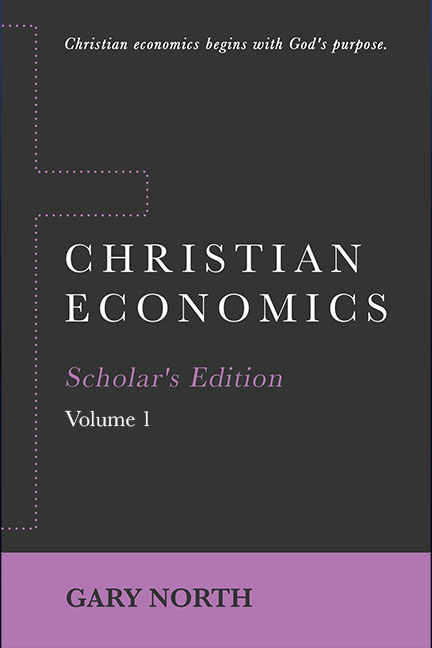
Christian Economics Volume 4: Scholar’s Edition – Volume 1
Gary North
Narrated By: Troy Lynch
Topics: Economics
Library: Gary North Library
Proverbs 8 is the voice of wisdom. We read: “For whoever finds me, finds life, and he will find the favor of the Lord. But he who fails, harms his own life; all who hate me love death” (vv. 35–36). So, wisdom is worth pursuing. You must now begin to estimate this worth.
How committed are you to gaining biblical wisdom in economics? To answer this honestly, you must first answer these three questions. These are the three questions you should ask yourself before embarking on any major project.
What do I want to accomplish?
How soon do I want to accomplish it?
What am I willing to pay?
This is how Jesus put it. “For which of you, desiring to build a tower, does not first sit down and count the cost, whether he has enough to complete it? Otherwise, when he has laid a foundation and is not able to finish, all who see it begin to mock him, saying, ‘This man began to build and was not able to finish’” (Luke 14:28–30). In short, count the cost. But also count the potential benefits.
One of the fundamental principles of all systems of economic theory is this: “You can’t get something for nothing.” Christianity teaches that God offers saving grace to some people without cost to them. But this grace is based on the high price that Jesus Christ paid at Calvary. Furthermore, God’s grace has purposes: “For by grace you have been saved through faith. And this is not your own doing; it is the gift of God, not a result of works, so that no one may boast. For we are his workmanship, created in Christ Jesus for good works, which God prepared beforehand, that we should walk in them” (Ephesians 2:8–10).
Christian economics does not teach the labor theory of value. Economic value does not come from work. It comes from the imputation of God and then (maybe) consumers. Absorbing information is insufficient to please God. You must convert this information into useful service. This process of service should already have begun in your life. James wrote: “But be doers of the word, and not hearers only, deceiving yourselves. For if anyone is a hearer of the word and not a doer, he is like a man who looks intently at his natural face in a mirror. For he looks at himself and goes away and at once forgets what he was like. But the one who looks into the perfect law, the law of liberty, and perseveres, being no hearer who forgets but a doer who acts, he will be blessed in his doing” (James 1:22–25).
You may think that God has called you to be a scholar. He has called very few people to this form of service through the ages. There are salaried scholars in colleges and universities today, but this was not a widespread phenomenon until after World War II (1941–45). If you decide to be a Christian scholar who goes to the Bible in search of first principles and also specific applications, you will find it difficult to be employed as a professor. Your presence on the faculty will embarrass the other faculty members. Also, you will be required by the department to assign textbooks and monographs that are structured in terms of humanism’s principles of interpretation. So, your scholarship will have to be mostly outside the classroom unless you are granted a degree of independence that is rare. Do not count on such independence. Scholarship will have to become your calling, which I define as follows: “The most important thing you can do with your life in which you would be most difficult to replace.”
There is no career advantage, academic or otherwise, associated with affirming Christian economics as a separate discipline. There are many career disadvantages. Why should this be the case? Because Ph.D.-holding economists have been screened by their formal academic training and then by subsequent peer-reviewed work. This system of screening is methodologically atheistic. The entire modern university curriculum is structured in terms of this presupposition: “The God of the Bible and His revelation in the Bible are irrelevant to academic discourse or public debate.” By promoting Christian economics, you will be saying implicitly that your peers have been unfaithful to God to the extent that they have been faithful to the operating presuppositions of academic economic theory and academia in general. They will understand this. They will resent the implication. They will not applaud your efforts. They will ignore your efforts if they can. If they cannot safely ignore your work because you become prominent, they will criticize it. Do not expect them to read what you have written. Do not expect them to be honest in analyzing your work even if they have read smatterings of it.
Do not let this bother you. Keep working. Keep publishing. The best defense is a good offense. Stick to your knitting.
